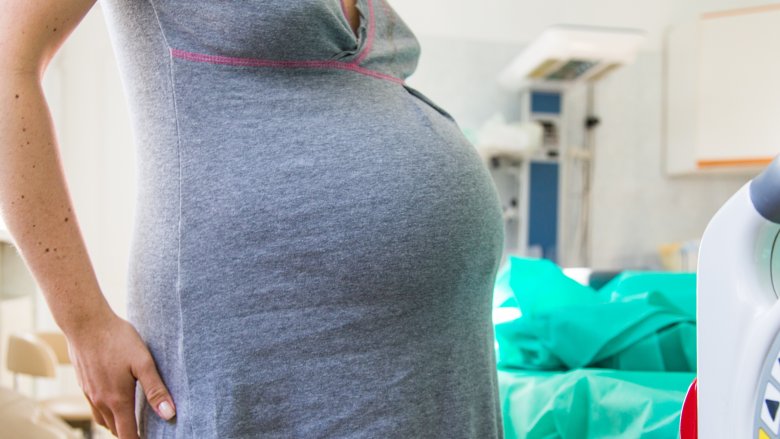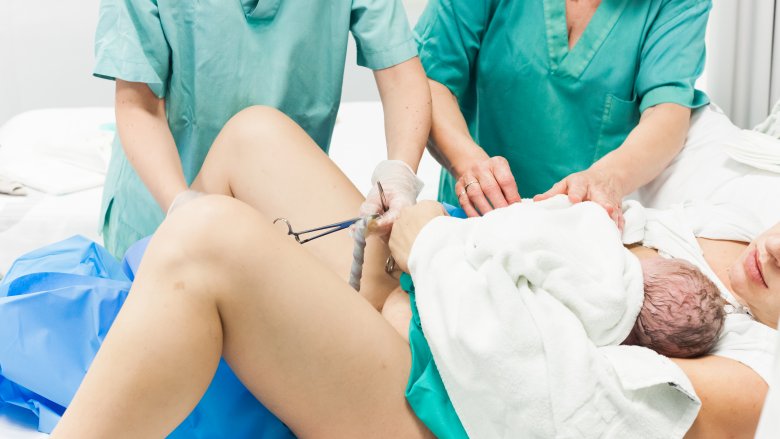What Really Happens To Your Body When You're In Labor
Delivering a baby is one of the most miraculous things a woman's body can do, and also one of the most painful. If you're pregnant, or if you plan to get pregnant soon, you may be wondering what actually happens to your body when you go into labor. Here's what the experts say you should be on the lookout for.
Your water breaks
One of the first things that happens when you go into labor is that your water breaks. Sherry Ross, OB/GYN, told me, "A sign that early labor has started is if your bag of water breaks, medically known as spontaneous rupture of membranes. For low risk women, the rupturing of the membranes occurs spontaneously when your body triggers a number of cellular events."
Just like the other parts of the birth process are different for each woman, you will experience your water breaking differently than other women will. Dr. Ross continued, "It may be a subtle 'leak' or a 'big gush' when your water breaks and you may or may not have uterine contractions. But one thing is definite, early labor will begin within hours of your water breaking."
In other words, if your water breaks, it's time to head to the hospital.
Your hunger and fatigue go away
You may think that giving birth would make you ravenous. After all, your body is doing a lot of tough physical work. However, Dr. Stephanie Romero, OB/GYN, told Splinter that's not the case. She told them, "People get very worried... about not eating while they're in labor, but you just don't get hungry. You don't get hungry and you don't want to eat."
Despite your body working so hard to push out your baby, you won't get tired, either. Dr. Romero told Splinter, "Fight or flight [keeps] you awake and gives you the power to keep pushing. No matter what time of day someone is in labor — whether it's 1 a.m. or 1 p.m. — they are wide awake and in the moment."
Even though your body is so busy giving birth that you won't have to worry about getting hungry or tired, you'll probably want to go to sleep afterward.
You get contractions
Contractions are one of the more well-known parts of the labor process. When you go into labor, your uterus contracts and starts pushing your baby out. Contractions are painful, but they're necessary to bring your baby into the world. Dr. Ross told me, "As you get closer to term (38 to 42 weeks), your uterus, which is one large muscle, will start to contract."
These early contractions, known as Braxton-Hicks contractions, aren't actually a sign of labor. Instead, they're getting your body ready for the labor that is coming in the future. Dr. Ross explained that for women who are low risk, you are likely not in early labor if contractions are irregular, sporadic, and you're experiencing minimal pain.
Dr. Ross advised, however, "Once the uterine contractions become regular, appear closer together with increased intensity, this is a sign that labor has started. Regular and painful uterine contractions, occurring every three to five minutes for two hours, are a sign early labor has begun."
You get back pain
While contractions are painful in and of themselves, they cause back pain, as well. In fact, one of the first signs you're having contractions is back pain. Dr. Ross explained, "Since the uterus is a large muscle, the cramping sensation of the uterus tightening mildly may be felt in the back when the contractions first begin."
You may also feel back pain that's unrelated to contractions. Kay Johnson, a certified nurse-midwife, told Parents, "Normally, a baby descends the birth canal with its face pressed against the mom's spine. But in some cases the baby descends with its skull hitting the mom's spine." When this happens, you'll experience pain that may be constant and may radiate to the abdomen even though it's mostly felt in the back.
Mucus comes out
As you might imagine, a lot of bodily fluids come out of your body along with your baby. One of those fluids is mucus. Dr. Ross explained, "Normally during pregnancy there is a mucus plug that covers the cervix which leads into the uterus to help protect the baby from an infection. As you get closer to delivering, the mucus plug will loosen and separate from the cervix."
The plug might come out as a precursor to labor, so if you find something gross in your underwear a few weeks beforehand, don't panic. Dr. Ross described the plug as a thick, gray, sticky, and clumpy discharge that you may find on your underwear or toilet paper.
If it doesn't come out before labor, a lot of mucus will definitely come out during labor. Dr. Romero told Splinter, "Some people say they've lost their 'mucus plug,' but in reality, there is no one real 'plug.' It's just lots and lots of mucus in the cervix that gets discharged and discharged and discharged. It looks like you blew your nose out of your vagina."
Gross, I know. But it's all part of the beautiful process of bringing a baby into the world.
You lose blood
In addition to losing mucus during labor, you also lose a lot of blood. But don't worry — blood loss is perfectly normal.
OB/GYN Kecia Gaither told me, "The placenta contains a lot of blood within it, and there is blood loss during delivery, which is why the body produced an increased volume of fluid during pregnancy in preparation for this event."
More blood also comes out when you push the placenta out after you give birth. Dr. Shannon Clark, an OB/GYN, told Splinter, "There's a big gush of blood that goes along with the placenta being delivered, and that scares women a little bit. But as physicians, we're programmed to know what's a normal amount of blood and what looks different and needs extra attention."
The cervix seems to disappear
When you give birth, your cervix does some pretty interesting things, including moving, thinning out, and, seemingly, disappearing. Dr. Gaither told me that during labor, the cervix "moves" from posterior to anterior position in your vagina. It then thins out and dilates to let your baby's head pass through from the uterus.
Dr. Romero told Splinter, that during this time it's almost like the cervix disappears. She added, "There's no other body part that does this disappearing and reappearing act like the cervix does during labor and delivery."
After labor, the cervix magically returns to its previous tiny shape. Dr. Romero told Splinter, "The most amazing part of this whole process is that an opening that normally is so small you have to pull the skin apart to see it becomes relaxed enough to accommodate a human child coming through," she said, "and then afterwards, it goes back to its old shape."
Your vagina stretches
Just as your cervix changes a lot during labor, your vagina also stretches a lot when you give birth. Dr. Gaither told me, "During labor, the vagina stretches to accommodate the baby's body exiting, and with the increased lubrication allows the baby to essentially 'slide out.'"
Are you wondering how that feels? Dr. Gaither explained that women may feel pressure as their baby's head begins to deliver, similar to the feeling of needing a bowel movement.
If you're worried about what will happen to your vagina after you give birth, rest assured that while it won't go back to being completely the same as it was, it will heal and the swelling will go down. Dr. Mary Jane Minkin, clinical professor of obstetric, gynecology, and reproductive sciences at Yale School of Medicine, told Health, "This area can feel fairly uncomfortable for some time, though it does get better within a few weeks." She also shared that sitting in a warm tub can help swelling and pain subside. Doing kegels and other pelvic floor exercises will also help you experience a quicker healing period after you give birth.
You deliver the placenta and then your uterus contracts
After you deliver your baby, you'll deliver your placenta as well. Then your uterus will begin to contract to its pre-pregnancy size.
Dr. Gaither explained, "The woman may have pain after delivery as the uterus clamps down and involutes, or begins its journey to shrinking down to almost its pre-pregnancy size."
Even though it's painful, your uterus contracting is actually a good thing. Dr. Gaither told me, "By clamping down, it also serves to close off all those open vessels that are present after the placenta delivers."









